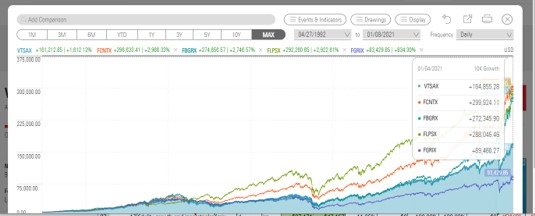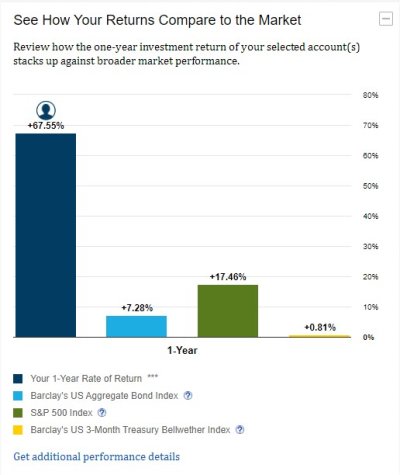IMHO, Morningstar has the best fund research tools around. A good amount of info for "free", but the better / more in-depth info will run you roughly $199/yr. I've had a subscription for years..
Unfortunately, they "re-did" the website a year or two back, and it's a lot less beneficial than it used to be. We lost a lot of good tools, like the ability to directly compare one fund against another in terms of 1, 3, 5, 10 yr performance, risk metrics, etc.
There's also PortfolioVisualizer (
https://www.portfoliovisualizer.com/). Great tools there for backtesting, but as they say.."past performance is no guarantee of future results". It used to be entirely free and some features still are, but the one I use the most - Save and Load Portfolios, now requires a $19 / mo (!!!) subscription. No thanks. That's more than M*, and M* has a heck of a lot more useful info IMHO.
All that said, you've also somewhat (probably unintentionally, LOL!) stepped right into the proverbial Pandora's box of active v. passive management debate. Many will say there is no need to "pick" funds and instead just own index funds that cover the whole market, and there is good in-depth data that supports that view. HOWEVER - there's risk in doing that also. As they say..a rising tide lifts all boats..and a dropping tide sinks all boats. So, as long as the markets in general are going north - all is good. But God help you if you get caught up in the mass exodus where, for instance, the S&P500 suddenly takes a downturn and stays in a downturn for a while. In those market scenarios, the argument is often made that active management MAY outperform passive. Historically that hasn't proven to always happen, but I do think in the newer market scenario where everybody and their brother is favoring index fund investing that we may see a time where index fund investing underperforms active in some more extreme market drop scenarios going forward.
Your best bet whether going active or passive is to own "most" (if not all) segments of the market (Large/Mid/Small and Growth/Core/Value - and every combination thereof, whether that's by owning a "Total Market" fund or like I did - picking specific funds that cover each of the 9 segments). I personally have some of my assets in index funds..and some in active funds. But - I took a ton of time to build a portfolio that covers combinations of Large, Mid and Small Cap stocks, Growth, Core and Value stocks, Internationals (LG-Growth, LG-Value and Small-Growth in my case) and more. I even have a Healthcare fund that I bought based on conviction that HC will outperform the market in years to come. Ditto, a Tech fund I own. Then there's the quirky stuff like a small cap International, Emerging Markets debt, Foreign Bond, etc. Of course, managing that diverse of a portfolio can be a real PITA, and you either have to a) love it or b) have lots and lots of free time - or both.
Hope that helps at least a little..I'm sure I probably just kicked the hornets nest a bit on the whole active/passive thing

, but Portfolio Construction - and more importantly, Asset Allocation (which compelling research data says is even MORE determinative of results than the specific funds one picks) are fascinating subjects that often don't get the attention they deserve with the all too frequent "just buy the total market and be done with it" approach often advocated..


